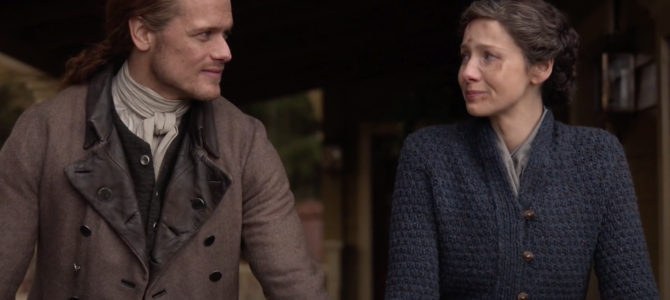
This article contains spoilers and graphic content.
The fifth season finale of “Outlander” just aired on Starz and wow, it was stunning. It was also the last new episode to air for at least a year, according to predictions.
According to lead actor Sam Heughan’s Twitter, the “Outlander” crew hasn’t even started filming season six, although the show has been contracted to do a seventh season as well. So now we head into what hardcore fans call the “Droughtlander,” our long wait for a new season.
Before the fatigue sets in, let’s recap the final season and appreciate some of its best episodes. Or, if you’re new, hopefully this encourages you to binge the show before the country reopens. You can watch the first three seasons on Netflix. For seasons four and five, you’ll have to purchase a Starz subscription.
Season Five Moves Slower, Showing Depth of Character
As I get older, some things get more complicated, while other things simplify. The same is true in “Outlander’s” season five, and in the main characters, Jamie and Claire. The first few seasons were chock full of huge battles, steamy sex scenes, mind-boggling time travel, and we-can’t-go-back-from-here arguments.
In comparison, season five is more of a slow burn in all the major themes for which “Outlander” is known, from sex and relationships to politics and war. In a sense, it’s the calm before the storm. That doesn’t mean it’s not interesting, but if you’re just sitting down to watch season five, it may feel a bit slower than others.
Still, what it might feel like it lacks in pace, “Outlander” makes up for in character development. We see Roger and Brianna make a formal commitment to one another in a beautiful marriage ceremony. Young Ian returns from living with a Native American tribe an entirely different, mature man. That’s one of the season’s mysteries: What happened to Ian that makes him feel at first suicidal, then wishing to go back in time like Claire?
The best character development, I think, is Jamie and Claire both individually and as a couple. They’re older now, and grandparents to Brianna and Roger’s boy, Jemmy. While this makes for fewer of the steamy sex scenes for which “Outlander” is known, what takes their place is a deepening of the couple’s love, sacrifice, commitment. They’re just as happy playing with their grandson or siting by the fireplace as they are having sex. (Don’t get me wrong, this isn’t entirely missing from this season, but it’s not as much of a main element.)
This Season Explored Commitment to Country During Revolution
Season five ends just before 1776 arrives, which should occur in season six. At the beginning of season five, Jamie explains to his fellow settlers on Fraser’s Ridge, which are mostly Scots settling in North Carolina, that he will require their loyalty at some point both as Scotsmen and Americans. It’s a beautiful, moving scene and Jamie does indeed call upon these people when a group of men abduct Claire in the season finale, which is as dramatic and harrowing as it sounds.
America’s political history starts to get even more complex around this time period. You can feel the conflict beginning to brew this season, a preview of what’s to come.
Grappling with the Ethical Questions of Time Travel
Part of the charm (and sometimes confusion) of “Outlander” is that Claire has traveled backward in time about 200 years. This often raises ethical questions: If you knew America was going to win the battle for Independence, but at great cost, would you do something to prevent loss of life? If you knew how and approximately when your husband, the love of your life, was going to die, would you try to stop it? Could you?
Claire faces all of these at some point and it really does provide some of the conflict that makes these episodes so interesting, even the slower-paced ones. While she does try to create life-saving medicine—penicillin—she seems to have made peace with the fact that they are unable to stop large, world-changing events. Knowing war is coming and neither Jamie nor Claire can stop it ensures they appreciate the time they have together and use it to prepare for war.
These questions on screen tend to make the audience reflect on the same difficult, ethical questions: What would you really change if you could? If you changed those things, would you have what you really wanted or deserved? If you changed one big thing about the future, would you have to give up something valuable from your current life in order to do so? These are all fascinating philosophical questions “Outlander” raises but doesn’t necessarily answer.
Sacrifice and Maturity Are Prevalent Themes
Time and again in this story, Jamie and Claire find themselves in situations where they are harmed, someone they love is harmed, or they face great danger. Rather than become bitter, both characters learn from adversity and become stronger people and a more unified couple despite rape, imprisonment, death of loved ones, illness, war, PTSD, and so on. “Outlander’s” exploration of characters handling adversity, like many great popular series, is what makes some episodes difficult to watch but also binge-worthy.
Even after Claire is brutally raped, she doesn’t appear bitter, but simply grateful for every day of peace in America with the people she loves. It’s an enduring, satisfying message of hope, just as America was about to change forever through its own violent rebirth.
If you have suffered sexual violence and need help, please reach out: https://www.rainn.org/about-national-sexual-assault-telephone-hotline and 1-800-656-5673.









